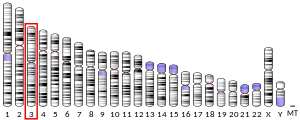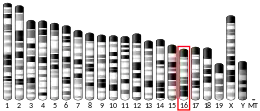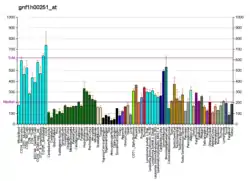TIMMDC1
TIMMDC1 is a protein that in humans is encoded by the TIMMDC1 gene.[5][6] It is a chaperone protein involved in constructing the membrane arm of mitochondrial Complex I.[7] A frameshift mutation in an intron of this gene has been shown to cause failure to thrive, retardation of psychomotor development, infantile-onset hypotonia, and severe neurologic dysfunction.[8] High expression of this gene has been associated with migration of lung cancer cells while depletion of the protein has been shown to affect regulation of apoptosis, the cell cycle, and cell migration.[9]
| TIMMDC1 | |||||||||||||||||||||||||||||||||||||||||||||||||||
|---|---|---|---|---|---|---|---|---|---|---|---|---|---|---|---|---|---|---|---|---|---|---|---|---|---|---|---|---|---|---|---|---|---|---|---|---|---|---|---|---|---|---|---|---|---|---|---|---|---|---|---|
| Identifiers | |||||||||||||||||||||||||||||||||||||||||||||||||||
| Aliases | TIMMDC1, C3orf1, translocase of inner mitochondrial membrane domain containing 1, MC1DN31 | ||||||||||||||||||||||||||||||||||||||||||||||||||
| External IDs | OMIM: 615534 MGI: 1922139 HomoloGene: 9578 GeneCards: TIMMDC1 | ||||||||||||||||||||||||||||||||||||||||||||||||||
| |||||||||||||||||||||||||||||||||||||||||||||||||||
| |||||||||||||||||||||||||||||||||||||||||||||||||||
| |||||||||||||||||||||||||||||||||||||||||||||||||||
| |||||||||||||||||||||||||||||||||||||||||||||||||||
| |||||||||||||||||||||||||||||||||||||||||||||||||||
| Wikidata | |||||||||||||||||||||||||||||||||||||||||||||||||||
| |||||||||||||||||||||||||||||||||||||||||||||||||||
Structure
The TIMMDC1 gene is located on the q arm of chromosome 3 in position 13.33 and spans 25,760 base pairs, with 7 exons.[6] The gene produces a 32.2 kDa protein composed of 285 amino acids.[10][11] The TIMMDC1 protein has 4 transmembrane domains, with the N-terminal and C-terminal extensions localized in the mitochondrial matrix. TIMMDC1 is a multipass mitochondrial inner membrane protein, predicted to be a member of the 4-pass transmembrane protein family of TIM17-TIM22-TIM23. Its topology is predicted to be analogous to TIMM23.[12]
Function
TIMMDC1 is a chaperone protein involved in the assembly of the mitochondrial Complex I (NADH-ubiquinone oxidoreductase), participating in the construction of the membrane arm of complex I.[7]
Clinical Significance
A frameshift mutation in intron 5 of the TIMMDC1 gene has been shown to cause severe neurologic dysfunction, infantile-onset hypotonia, retardation of psychomotor development, and failure to thrive.[8] Additionally, high expression of TIMMDC1 has been associated with metastasis of lung carcinoma cells, with depletion of the protein inhibiting growth and migration of 95D lung carcinoma cells. Depletion of TIMMDC1 has also been shown to alter expression of genes involved in the regulation of apoptosis, cell-cycle arrest, and cell migration, including CCNG2, PTEN, TIMP3, and COL3A1.[9]
Interactions
The TIMMDC1 protein interacts with the intermediate 315 kDa subcomplex of incompletely assembled complex I and has interactions with FATE1, in addition to about 60 other proteins.[13][7] TIMMDC1 associates reciprocally with multiple components of the ECSIT-TMEM126B-ACAD9-NDUFAF1 assembly factor complex (MCIA complex).[12]
References
- GRCh38: Ensembl release 89: ENSG00000113845 - Ensembl, May 2017
- GRCm38: Ensembl release 89: ENSMUSG00000002846 - Ensembl, May 2017
- "Human PubMed Reference:". National Center for Biotechnology Information, U.S. National Library of Medicine.
- "Mouse PubMed Reference:". National Center for Biotechnology Information, U.S. National Library of Medicine.
- Escarceller M, Pluvinet R, Sumoy L, Estivill X (Mar 2001). "Identification and expression analysis of C3orf1, a novel human gene homologous to the Drosophila RP140-upstream gene". DNA Sequence. 11 (3–4): 335–8. doi:10.3109/10425170009033252. PMID 11092749. S2CID 20254976.
- "Entrez Gene: C3orf1 chromosome 3 open reading frame 1".
 This article incorporates text from this source, which is in the public domain.
This article incorporates text from this source, which is in the public domain. - "TIMMDC1 - Complex I assembly factor TIMMDC1, mitochondrial - Homo sapiens (Human) - TIMMDC1 gene & protein". www.uniprot.org. Retrieved 2018-07-27.
 This article incorporates text from this source, which is in the public domain.
This article incorporates text from this source, which is in the public domain. - Kremer LS, Bader DM, Mertes C, Kopajtich R, Pichler G, Iuso A, et al. (June 2017). "Genetic diagnosis of Mendelian disorders via RNA sequencing". Nature Communications. 8: 15824. Bibcode:2017NatCo...815824K. doi:10.1038/ncomms15824. PMC 5499207. PMID 28604674.
- Wu H, Wang W, Xu H (November 2014). "Depletion of C3orf1/TIMMDC1 inhibits migration and proliferation in 95D lung carcinoma cells". International Journal of Molecular Sciences. 15 (11): 20555–71. doi:10.3390/ijms151120555. PMC 4264183. PMID 25391042.
- Zong NC, Li H, Li H, Lam MP, Jimenez RC, Kim CS, Deng N, Kim AK, Choi JH, Zelaya I, Liem D, Meyer D, Odeberg J, Fang C, Lu HJ, Xu T, Weiss J, Duan H, Uhlen M, Yates JR, Apweiler R, Ge J, Hermjakob H, Ping P (October 2013). "Integration of cardiac proteome biology and medicine by a specialized knowledgebase". Circulation Research. 113 (9): 1043–53. doi:10.1161/CIRCRESAHA.113.301151. PMC 4076475. PMID 23965338.
- "Complex I assembly factor TIMMDC1, mitochondrial". Cardiac Organellar Protein Atlas Knowledgebase (COPaKB). Archived from the original on 2018-08-02. Retrieved 2018-08-02.
- Guarani V, Paulo J, Zhai B, Huttlin EL, Gygi SP, Harper JW (March 2014). "TIMMDC1/C3orf1 functions as a membrane-embedded mitochondrial complex I assembly factor through association with the MCIA complex". Molecular and Cellular Biology. 34 (5): 847–61. doi:10.1128/MCB.01551-13. PMC 4023825. PMID 24344204.
- Lab, Mike Tyers. "TIMMDC1 (UNQ247/PRO284) Result Summary | BioGRID". thebiogrid.org. Retrieved 2018-07-27.
External links
- Human TIMMDC1 genome location and TIMMDC1 gene details page in the UCSC Genome Browser.
Further reading
- Maruyama K, Sugano S (January 1994). "Oligo-capping: a simple method to replace the cap structure of eukaryotic mRNAs with oligoribonucleotides". Gene. 138 (1–2): 171–4. doi:10.1016/0378-1119(94)90802-8. PMID 8125298.
- Suzuki Y, Yoshitomo-Nakagawa K, Maruyama K, Suyama A, Sugano S (October 1997). "Construction and characterization of a full length-enriched and a 5'-end-enriched cDNA library". Gene. 200 (1–2): 149–56. doi:10.1016/S0378-1119(97)00411-3. PMID 9373149.
- Hartley JL, Temple GF, Brasch MA (November 2000). "DNA cloning using in vitro site-specific recombination". Genome Research. 10 (11): 1788–95. doi:10.1101/gr.143000. PMC 310948. PMID 11076863.
- Wiemann S, Weil B, Wellenreuther R, Gassenhuber J, Glassl S, Ansorge W, Böcher M, Blöcker H, Bauersachs S, Blum H, Lauber J, Düsterhöft A, Beyer A, Köhrer K, Strack N, Mewes HW, Ottenwälder B, Obermaier B, Tampe J, Heubner D, Wambutt R, Korn B, Klein M, Poustka A (March 2001). "Toward a catalog of human genes and proteins: sequencing and analysis of 500 novel complete protein coding human cDNAs". Genome Research. 11 (3): 422–35. doi:10.1101/gr.GR1547R. PMC 311072. PMID 11230166.
- Simpson JC, Wellenreuther R, Poustka A, Pepperkok R, Wiemann S (September 2000). "Systematic subcellular localization of novel proteins identified by large-scale cDNA sequencing". EMBO Reports. 1 (3): 287–92. doi:10.1093/embo-reports/kvd058. PMC 1083732. PMID 11256614.
- Clark HF, Gurney AL, Abaya E, Baker K, Baldwin D, Brush J, Chen J, Chow B, Chui C, Crowley C, Currell B, Deuel B, Dowd P, Eaton D, Foster J, Grimaldi C, Gu Q, Hass PE, Heldens S, Huang A, Kim HS, Klimowski L, Jin Y, Johnson S, Lee J, Lewis L, Liao D, Mark M, Robbie E, Sanchez C, Schoenfeld J, Seshagiri S, Simmons L, Singh J, Smith V, Stinson J, Vagts A, Vandlen R, Watanabe C, Wieand D, Woods K, Xie MH, Yansura D, Yi S, Yu G, Yuan J, Zhang M, Zhang Z, Goddard A, Wood WI, Godowski P, Gray A (October 2003). "The secreted protein discovery initiative (SPDI), a large-scale effort to identify novel human secreted and transmembrane proteins: a bioinformatics assessment". Genome Research. 13 (10): 2265–70. doi:10.1101/gr.1293003. PMC 403697. PMID 12975309.
- Wiemann S, Arlt D, Huber W, Wellenreuther R, Schleeger S, Mehrle A, Bechtel S, Sauermann M, Korf U, Pepperkok R, Sültmann H, Poustka A (October 2004). "From ORFeome to biology: a functional genomics pipeline". Genome Research. 14 (10B): 2136–44. doi:10.1101/gr.2576704. PMC 528930. PMID 15489336.
- Mehrle A, Rosenfelder H, Schupp I, del Val C, Arlt D, Hahne F, Bechtel S, Simpson J, Hofmann O, Hide W, Glatting KH, Huber W, Pepperkok R, Poustka A, Wiemann S (January 2006). "The LIFEdb database in 2006". Nucleic Acids Research. 34 (Database issue): D415–8. doi:10.1093/nar/gkj139. PMC 1347501. PMID 16381901.




